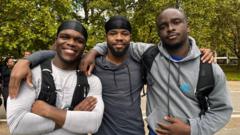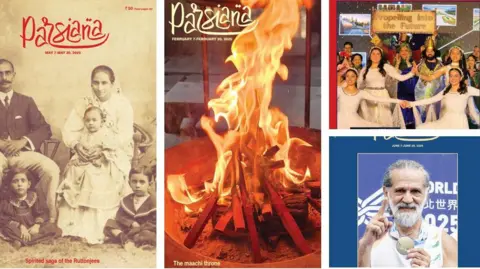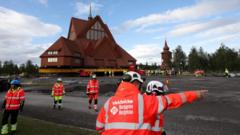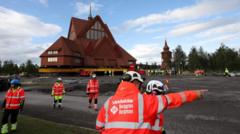The Ozo running club is echoing with the vibrant pulse of Afrobeats, as every Saturday, a diverse gathering of runners of Igbo descent convenes at London's picturesque Hyde Park. Founded by Chibueze Odoemene, Emeka Atumonyogo, and Chigo Ogbonna, the club’s primary aim is to forge connections amongst young Igbo people and bridge the gap between generations of Nigerian immigrants. Rapidly growing to over 300 members in just a few months, the Ozo club embodies an increasing trend in community-based running groups, as documented by Strava’s reported global surge of 59% in club participation this year.
More than just about physical fitness, the club leverages running as a channel to foster communal bonds, where the atmosphere is vibrant with the lively exchange of traditional Igbo phrases. “Igbo kwenu!” announces Mr. Odoemene, his voice resonating in the early morning air, only to be met with a chorus of unified responses from the group. This traditional call-and-response not only serves as an invocation to gather but also acts as a poignant reminder of the members' shared heritage.
As Funke Nkechi, another enthusiastic participant, shares, forming bonds with fellow Igbo individuals is vital. “I don't have a lot of Igbo friends,” she comments, revealing a longing for community. Newcomers like Jennifer Iwuamadi, 23, also resonate with this sentiment, eager to connect with their roots while partaking in the healthy activity of running.
Amidst growing membership numbers, the Ozo club faces dilemmas surrounding cultural authenticity and representation. Despite the Igbos’ notable presence in the diaspora, fears persist about the erosion of their unique cultural identity. The club serves not only as a fitness hub but also a response to the feeling of cultural marginalization that Igbos encounter—both in Nigeria and abroad.
This unique cultural gathering is welcoming not just to those of Igbo descent; members from diverse backgrounds – including Iranian, Italian, and Caribbean individuals – have joined, eager to experience the richness of Igbo culture firsthand. “You don’t have to be Igbo to participate,” enhances Mr. Atumonyogo, emphasizing inclusivity while encouraging curiosity among newcomers about Igbo traditions.
While immersing in the joys of running, the club's members continuously acknowledge the historical context surrounding their identity. Remnants of historical tension—the Biafran War, which caused devastation for the Igbo people—still influence perceptions. Through uplifting gatherings like the Ozo running club, members strive to redefine narratives around Igbo representation with pride, inviting the world to acknowledge their cultural uniqueness rather than conforming to broader stereotypes often linked to Nigerian identity.
The club's activities extend beyond just running, incorporating social events like karaoke and an upcoming Igbo gala—allowing members to connect on multiple levels. As the weekend meet concludes, the reinforcing chant of togetherness binds participants, who exchange contact details while promising to reunite for their next run. The Ozo running club, thus, stands as a powerful testament to community, resilience, and cultural celebration for Nigerians in London.
More than just about physical fitness, the club leverages running as a channel to foster communal bonds, where the atmosphere is vibrant with the lively exchange of traditional Igbo phrases. “Igbo kwenu!” announces Mr. Odoemene, his voice resonating in the early morning air, only to be met with a chorus of unified responses from the group. This traditional call-and-response not only serves as an invocation to gather but also acts as a poignant reminder of the members' shared heritage.
As Funke Nkechi, another enthusiastic participant, shares, forming bonds with fellow Igbo individuals is vital. “I don't have a lot of Igbo friends,” she comments, revealing a longing for community. Newcomers like Jennifer Iwuamadi, 23, also resonate with this sentiment, eager to connect with their roots while partaking in the healthy activity of running.
Amidst growing membership numbers, the Ozo club faces dilemmas surrounding cultural authenticity and representation. Despite the Igbos’ notable presence in the diaspora, fears persist about the erosion of their unique cultural identity. The club serves not only as a fitness hub but also a response to the feeling of cultural marginalization that Igbos encounter—both in Nigeria and abroad.
This unique cultural gathering is welcoming not just to those of Igbo descent; members from diverse backgrounds – including Iranian, Italian, and Caribbean individuals – have joined, eager to experience the richness of Igbo culture firsthand. “You don’t have to be Igbo to participate,” enhances Mr. Atumonyogo, emphasizing inclusivity while encouraging curiosity among newcomers about Igbo traditions.
While immersing in the joys of running, the club's members continuously acknowledge the historical context surrounding their identity. Remnants of historical tension—the Biafran War, which caused devastation for the Igbo people—still influence perceptions. Through uplifting gatherings like the Ozo running club, members strive to redefine narratives around Igbo representation with pride, inviting the world to acknowledge their cultural uniqueness rather than conforming to broader stereotypes often linked to Nigerian identity.
The club's activities extend beyond just running, incorporating social events like karaoke and an upcoming Igbo gala—allowing members to connect on multiple levels. As the weekend meet concludes, the reinforcing chant of togetherness binds participants, who exchange contact details while promising to reunite for their next run. The Ozo running club, thus, stands as a powerful testament to community, resilience, and cultural celebration for Nigerians in London.






















